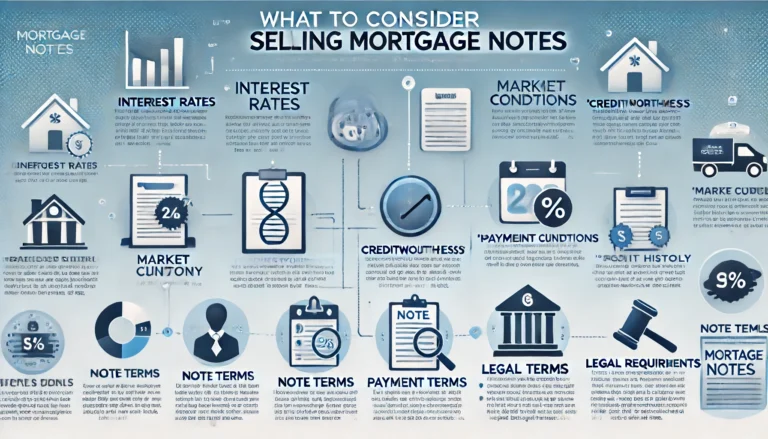What is a note sale in real estate?
Table Of Contents
Evaluating the Market for Real Estate Note Sales
When evaluating the market for real estate note sales, it is crucial to consider various factors that can impact the value and demand for these assets. Market conditions, such as interest rates, property values, and economic trends, play a significant role in determining the attractiveness of investing in real estate notes. Additionally, understanding the supply and demand dynamics within the note sales market can help investors make informed decisions about purchasing or selling notes.
Analyzing historical data and trends in real estate note sales can provide valuable insights into the market’s performance and potential opportunities for growth. By tracking key metrics such as average note sale prices, transaction volume, and default rates, investors can gain a better understanding of market trends and patterns. This information can help investors identify emerging opportunities and risks in the real estate note sales market, allowing them to make strategic investment decisions based on data-driven analysis.
Identifying Trends and Opportunities
Identifying trends and opportunities in real estate note sales is crucial for investors looking to maximize their returns in this niche market. One key trend to watch is the increasing popularity of investing in performing notes, which are mortgage notes where the borrower is making timely payments. These notes can provide a more stable and consistent cash flow compared to non-performing notes, making them an attractive option for investors seeking steady returns.
Another opportunity to consider is the rise of technology platforms that connect buyers and sellers of real estate notes. These online marketplaces offer increased transparency, efficiency, and access to a wider range of note investments. Investors should stay informed on the emergence of these platforms and consider leveraging them to streamline their note investment process. By keeping an eye on these trends and opportunities, investors can position themselves to make informed decisions and capitalize on the evolving landscape of real estate note sales.
Utilizing Note Sales as a Real Estate Investment Strategy
When considering real estate investment strategies, note sales can offer a unique opportunity for investors to diversify their portfolios. Investing in real estate notes involves purchasing the debt from a borrower, essentially becoming the lender. This method allows investors to earn passive income through the interest payments made by the borrower. Additionally, note sales can provide a more stable and predictable cash flow compared to traditional rental properties, as the investor is not responsible for property maintenance or tenant turnover.
Another benefit of utilizing note sales as an investment strategy is the potential for higher returns compared to other real estate investment avenues. By purchasing distressed notes at a discount, investors have the opportunity to negotiate favorable terms with the borrower or acquire the underlying property at a reduced price through foreclosure. This can lead to significant profits for investors, especially if the property appreciates in value over time. Ultimately, incorporating note sales into a real estate investment portfolio can offer an alternative way to generate passive income and achieve long-term financial growth.
Diversifying Portfolios through Note Sales
Diversifying portfolios through note sales can offer investors a unique opportunity to expand their investment holdings beyond traditional real estate assets. By incorporating real estate notes into an investment portfolio, individuals can potentially achieve a more diversified mix of assets, which may help reduce overall risk exposure. This diversification can be particularly beneficial in times of economic uncertainty or market volatility, as it can provide a level of insulation against fluctuations in any single asset class.
Moreover, note sales allow investors to tap into a different facet of the real estate market, one that involves the financing aspect rather than direct ownership of physical properties. This alternative investment strategy can offer a separate avenue for generating returns and income streams, potentially enhancing the overall stability and resilience of an investment portfolio. By exploring note sales as a complementary investment approach, investors may be able to further optimize their portfolios and achieve a more balanced and robust financial position.
Risks and Challenges Associated with Note Sales
One of the primary risks associated with real estate note sales is the potential for default by the borrower. If the borrower fails to make timely payments or defaults on the loan, the investor may face financial losses or lengthy legal proceedings to recover the debt. It is crucial for investors to conduct thorough due diligence on the borrower’s creditworthiness and the property securing the note to minimize this risk.
Another challenge in real estate note sales is the lack of liquidity compared to other investments. Once an investor purchases a real estate note, it can be more difficult to sell quickly if the need arises. This illiquidity may tie up capital for an extended period, impacting the investor’s ability to take advantage of other investment opportunities or handle unexpected financial needs. As such, investors should carefully consider their investment horizon and liquidity needs before engaging in real estate note sales.
Mitigating Potential Pitfalls in Note Transactions
Mitigating potential pitfalls in note transactions requires a thorough understanding of the risks involved and proactive measures to address them. One key aspect to consider is conducting comprehensive due diligence to assess the quality and performance of the underlying collateral. This includes reviewing property appraisals, borrower credit histories, and payment histories to gauge the likelihood of timely repayment.
Another critical factor in mitigating risks is to ensure clear and carefully drafted legal documentation outlining the terms of the note sale. This helps in clarifying the rights and responsibilities of all parties involved, reducing the chances of disputes or misunderstandings in the future. Working closely with legal professionals who specialize in real estate transactions can provide valuable insights and guidance in navigating potential pitfalls effectively.
FAQS
What is a real estate note sale?
A real estate note sale involves the transfer of the debt obligation from the original lender to a new investor in exchange for a lump sum payment.
How do real estate note sales work?
In a real estate note sale, the investor purchasing the note becomes the new creditor and is entitled to receive the future payments on the loan, including principal and interest.
What are the benefits of participating in real estate note sales?
Participating in real estate note sales can provide investors with a steady stream of passive income, diversification in their investment portfolio, and the potential for higher returns compared to other traditional investments.
What are the risks associated with real estate note sales?
Risks associated with real estate note sales include the potential for default by the borrower, fluctuations in the real estate market, and challenges in assessing the true value of the note.
How can investors mitigate risks in real estate note sales?
Investors can mitigate risks in real estate note sales by conducting thorough due diligence, diversifying their investments, and working with experienced professionals in the industry to navigate potential pitfalls.







